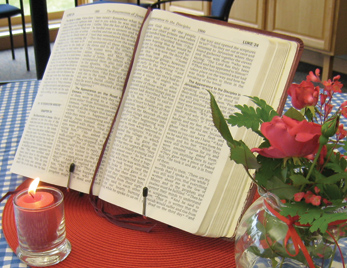May Christ bring us all together to everlasting life. Rule of Benedict
Sandwiched between Job and Proverbs in the Old Testament, scholars believe the Psalms were written both during King David's time, and one or two hundred years later, by indeterminate authors. Jews have been praying them for 2500 years; Christians, since the time of Christ. But why? What are the Psalms but a collection of hard-to-understand poems from a time utterly different from our own? What gives them their life? Of what importance can they be to us, today?
Benedictines immerse themselves in the Psalms at least three times - and sometimes as many as seven times - every day during the Liturgy of the Hours. By the time the Benedictine Sisters of St. Mary Monastery celebrate their 50th jubilees, they have spent well over 20,000 hours praying and pondering the Psalms together. Let's just say the Sisters know the Psalms.
But how do they feel about them ... and why?
"I love them," Sr. Susan Hutchens, OSB, begins. "They express every human emotion – joy, sorrow, anger, regret, hope. When we pray these prayers together, we join monastics, clergy and laypeople throughout time and across the globe in our prayer."
Throughout time, indeed. The Psalms were the prayers of the Jews in Jesus' time. Jesus himself would have learned how to pray by praying the Psalms, as his mother would have before him. Some Psalms prophesized His coming. Others offer praise, give thanks, express woe and wisdom. Some are considered historical in content, and often express rage and a desire for revenge.
Reflecting on the meaning
"Some of the Psalms are angry," Sr. Mary Core, OSB, says. "But every one of the 150 Psalms has something to teach us. If you keep yourself open to being changed, you might be surprised at what happens."
Try Psalm 64:
O God, hear my anguished voice; from the foes I dread protect my life.
Hide me from the malicious crowd, the mob of evildoers.
They sharpen their tongues like swords, ready their bows for arrows of poison words.
They shoot at the innocent from ambush shoot without risk, catch them unawares.
They resolve on their wicked plan; they conspire to set snares; they say:
'Who will see us?'
But God will shoot arrows at them and strike them unawares.
They will be brought down by their own tongues;
all who see them will shake their heads.
Then all will fear and proclaim God's deed, pondering what has been done.
The just will rejoice and take refuge in the Lord; all the upright will glory in their God.
"There are many ways to reflect on the prayers that ask God to hurt your enemies," Sr. Mary says. "To begin with, you might ask yourself who your enemies really are. You might want to reflect on your own anger. And who among us hasn't wished ill will on someone before? The Psalms allow us to say out loud the things we are too polite to say any other way."
Such reflection helps open the dialogue that is prayer, Sr. Mary notes.
"We're not just reading these words," she says. "We're engaging in dialogue with God. Maybe, as you read, you'll be drawn to a single word or an idea. Take your time with it. Carry it around with you for a while, and let it work on you. See what you find."
Psalms for every emotion
When you ponder in that fashion – letting words from Scripture sink in and move you – you open yourself to God's wisdom for you. But, with 150 Psalms to choose from, you can choose one that feels right for you at the moment.
"No one Psalm has everything for everyone," Sr. Susan says. "If I need comfort, I might turn to one of my favorites. I love Psalm 25: I wait for you, O Lord; I lift up my soul to my God. I also love Psalm 27: The Lord is my light and my salvation; whom do I fear? But sometimes I'll just open the book to any page, and see what I find."
As for relating the Psalms to our own lives, Sr. Marilyn Ring, OSB, says the human condition hasn't changed a bit since they first were written.
"There is still evil, there is still hope in the world," she says. "The Psalms are poetry, and you can do in poetry what you cannot do in prose. You can rage against God, for one thing. I get angry with God. I need to be able to say, 'Where were you during this crisis?' The poetry of the Psalms allows me to say that, while turning my heart toward hope, and God's goodness, at the end."
That the Psalmists deeply believed in, confided in, trusted in and hoped in God – the same God as we pray to today – provides a profound connection with all of humanity, living and dead.
"When we pray the Psalms, we are the voice of the Church," Sr. Susan says. "We pray with those who went before us and those who will come after us. We pray for those who do not have the heart to pray for themselves. When we go into chapel to pray How long, Lord? Will you utterly forget me? (Ps. 13), our voices become the voices of those who are in such despair that they cannot find their own voice. That is, I may not need to pray that prayer right now, but someone, somewhere needs to pray it. I lift my voice for that person."
The power of the Psalms is difficult to overstate. Truly, they give voice to the heart and soul of what makes us – and Jesus Christ himself – human. When we pray them, or are enveloped by the prayers of those who pray for us all, we experience God's Word from the beginning, for now, and for all time.
